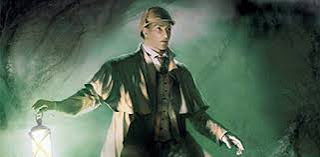
My hubby and I have an ongoing joke. When a character is killed off or leaves a TV show, we call it a
contract dispute. For example, the character of
Lance Sweets from the show
Bones was killed in the Season 10 opener. Boy that was a shocker! Other major characters have left or met their demise on other popular shows such as
NCIS and
CSI. The most recent contract dispute falls in the lap of
Doctor Derek Shepherdwho went out with a bang (literally) when his car gets T-boned by a truck, and he hangs on for dear life for at least a couple more episodes of
Grey’s Anatomy. A sad day indeed. Sniff.
The exit of these characters got me thinking. When is it the right time to kill or remove a character from an ongoing book series? Is it when the character stops meeting the readers’ needs and expectations? Do the characters become boring? Stop growing? Refuse to change? Perhaps. I guess the best sounding board would be the readers. Listening to them on the social media or reading the reviews they post. Are they sick of Character X? Does Character Y make them want to vomit? Or do readers even relate to Character Z? Mind you, I’m not sure killing a character off would have the same effect in sales as it does for TV ratings, but you never know until you try. Bahaha…

However, if you kill the wrong character you’ll have blood on your hands and angry readers. Case in point—when Arthur Conan Doyle killed
Sherlock Holmes by sending him over a waterfall with his arch enemy Professor Moriarty in tow, it wasn’t pretty. I mean for Sir Arthur, and the readers demanded satisfaction. Seriously? What was he thinking? Note to self: don’t piss your fans off!
In my time travel series, The Last Timekeepers, I’ve seriously thought about replacing certain characters to freshen up the series as it progresses, although nothing is written in stone yet. Readers are continually looking for new and improved characters to keep them invested in any series. That’s the reason why TV shows keep introducing new characters into a series. Even J.K. Rowling added new characters (and killed off a bunch) throughout her Harry Potter series.
So my question is: when must a character die or leave? I’m guessing there are so many answers to that question, but the reason I’d off one of my characters is when there’s no more room for character development or growth. That’s what Sir Arthur Conan Doyle attempted to do when he killed off Sherlock Holmes—he tied up all the loose ends and made sure Holmes lived a full life. Unfortunately, Doyle underestimated his readers, even though he wanted to cash out and move on to writing other books. And to this day, Sherlock Holmes has survived his creator, and duped death. Now that’s one loved character!
Thank you for reading my blog! So, what characters would you like to see killed/removed from your favorite book series? Love to hear your answers! Cheers!
 newest »
newest »
 newest »
newest »
 newest »
newest »
Personally I think the story has to flow and if that means a character needs to meet his "contract dispute" - so be it. As you know from my horror work, I don't write many endearing characters and death in my stories is inevitable and often messy, but I still need to protect my major players.
Unlike TV where everyone is a star, books have major and minor characters. Killing off a major character ends the story. That was Doyle's intent with the death of Holmes. Where as killing off a minor character gives the major characters something new to do.
If you feel you need to freshen things up, do a detour, a major out-of-the-box detour, for a chapter or two (keeping readers guessing is always a winner). Kill off a minor character - the more minor the better - and let the action impact your major players. They grow and display new characteristics your readers haven't seen yet. Surprise them with some negative traits. Sometimes heroes are just too perfect and get boring quick. Add a new player, with a radically different personality, to the mix. (I'm seriously rambling - but I'm sure you get the idea)
You can freshen your series, put more human into your characters, and even add plot twists. This can be a major win-win. Just be careful - don't make it look like it's an afterthought or a plug-in - stay in the story. It must still flow smoothly, even if its going in several directions.